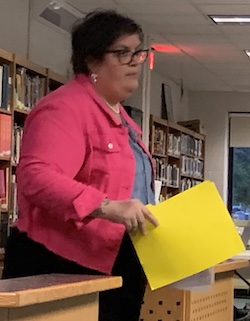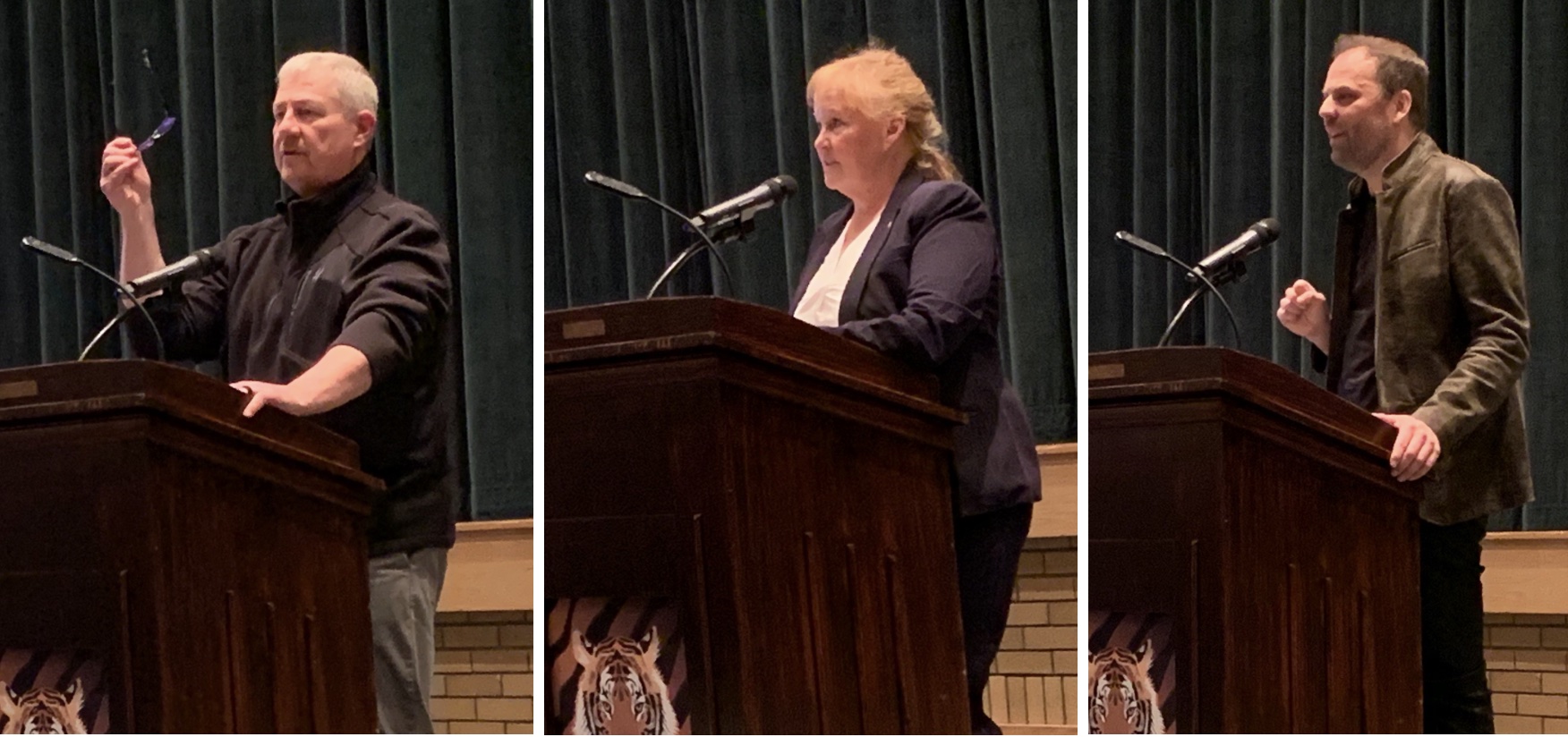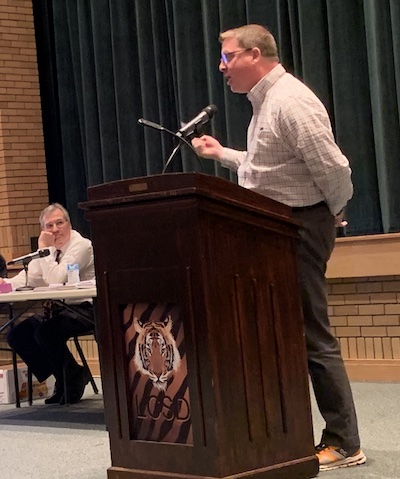‘Backstabbing, lying and deceit’ – Tensions erupt from Lyndonville teachers, BOE over health insurance
LYNDONVILLE – There is a big rift between the Lyndonville Teachers Association and some members of the board of education over a health insurance option that teachers say doesn’t include many of their current medical providers, would result in a higher cost to teachers with less coverage.
Steve Vann, a board member who researched and put together the new proposal, says the plan offers comparable coverage and would save Lyndonville over $500,000 a year in reduced health insurance costs. Vann put the savings at $571,000 – which represents 10 percent of the district’s tax levy.
Vann, an executive who helps oversee many Burger King restaurants, said the high cost of health insurance threatens the financial stability of the district long-term. The proposed Lyndonville school budget has health insurance costs at $2,111,909 out of the district’s $17,664,583 total budget or 12 percent of the spending.
Vann and incumbent board members, Sue Hrovat and Ted Lewis, want the district to try to bring down those costs.
The issue has made for a very contentious election for the school board on May 21, and led to acrimony during Monday’s “meet the candidates” forum and then the BOE meeting that followed.
Harold Suhr, a current board member, said in his 65 years in Lyndonville he’s never seen such an atmosphere for the school board elections.
“I’ve never seen so much backstabbing, lying and deceit,” Suhr said during Monday’s Board of Education meeting.

Gina Marker, an English teacher at Lyndonville since 2002, said changes in the health insurance plan would lead to an exodus of teachers. “I have never felt less appreciated by the board,” she said.
Shane Price, the LTA president, spoke during Monday’s meeting and said the incumbent board members have “vilified” teachers, making them look greedy when they are among the lowest paid in the region and contribute a higher percentage towards their healthcare, 15 percent, than most other districts.
He faulted the district and board for bringing negotiations about employees into the public when the matter should have been private. Teachers also were only given five days to ask questions about the Cigna plan, and 10 days to decide whether to switch, which Price said wasn’t enough time for a review.
Lyndonville’s health insurance is currently part of consortium. Price said no other school districts use Cigna, where he said there are much higher deductibles and a shift away from guaranteed healthcare for retirees who paid into the system.
Price said he checked with his doctors and four out of six are not covered under plan.
Gina Marker, an English teacher at Lyndonville since 2002, spoke at the board member in response to what she said were “blatant lies and contradictory statements” from board members about the health insurance issue.
If Lyndonville made the change, it would drive away younger and veteran teachers, she said.
“I have never felt less appreciated by the board,” she said. “The school district will not run well using a model by a fast-food restaurant.”
The issue has been shelved for now, but the board said the district needs to find ways to rein in the health insurance costs, even if it’s within the current consortium. Vann said that group hasn’t invested any of the money paid for health insurance from Lyndonville in the past 28 years. Investing some of those funds would have generated more money and lowered Lyndonville’s costs, he said.
“There are better ways of doing business,” Vann said. “There’s a lot of money on the table we’re wasting.”
Vann said “scare tactics” from the LTA have prevented a robust discussion of the issue, and also interfered with the election. He said some teachers who have long been his friends have said they are told to keep campaign signs off their yards for the three incumbents who wanted to look at health insurance costs.
“Some of the employees are afraid to put my sign in their sign,” Vann said during the candidate forum. “Are you kidding me? In Lyndonville, NY.”
Sue Hrovat said the pressure to not put out signs for some candidates is “bullying” and an effort to disrupt the democratic process.
She sees the health care plan researched by Vann as a “win-win” for the district, but acknowledged it could have used better communication in the rollout.
Hrovat has 12 years on the BOE. She said she and other board members are more involved than a typical BOE and some schools, trying to provide oversight.
“It’s important to have experienced members at the helm,” she said.

Current Lyndonville board members spoke during Monday’s meeting, including from left: Board President Ted Lewis, Sue Hrovat and Steve Vann. They said the Lyndonville Teachers Association leadership isn’t being honest with all of its members. Vann said the LTA is using “scare tactics” to stymie discussion about health insurance.
Ted Lewis, the board president the past 11 years, responded to claims that the board is not transparent enough with some decision-making. Lewis said some of the decisions, especially involving personnel, are confidential and information shouldn’t be shared publicly.
Lewis said Lyndonville is a thriving small school with rising student academic scores, and increased student participation in athletics, music and extracurriculars.
He noted the board and the school administration were able to find a way to keep in-person education during the year of Covid restrictions in 2020-21, when many other districts were on a hybrid schedule with students out of the school setting three days a week or fully remote. Lewis praised the teachers for making that possible in Lyndonville.
Lewis said he worries about public schools in the country, with pressure from the state and federal governments to impose social policies. Teachers unions also wield tremendous power, and Lewis said he is concerned Lyndonville will find itself under pressure from many forces.
That’s why he wants to see a strong Board of Education that advocates for local control of the district.
He said the LTA wants more influence in the district, even though he said only about 15 percent of the teachers live in the Lyndonville community.
“Our teachers’ union has been quite vocal and aggressive in this election,” Lewis said.
He sees a shrinking student population in most local and upstate districts, and financial pressures could threaten the small districts in the future. That’s why Lyndonville should look at ways to maximize efficiencies and reduce some costs.
“The local school board is the last bastion of local control with our schools,” he said.
Patrick Whipple, a former Lyndonville elementary principal and administrator, said the board should provide more rationale for its decisions.

Patrick Whipple, a candidate for the board, said the BOE needs to be more transparent in its decision-making so the public and district employees know how conclusions are reached.
Whipple has been endorsed by the LTA, which isn’t backing the incumbents. But Whipple said he isn’t a “yes man.”
“I will go with the facts and the evidence,” he said. “There’s always compromise.”
Following procedure and policy “will take the emotion out of it” when it comes to making decisions, Whipple said.
He said the board would benefit from some new perspectives. He said the current group is often “an echo chamber.”
While he praised the board and administration for being “excellent financial stewards,” he said the district needs a easier to use website as well as social media to make residents more informed about the district.
The candidate discussion also included brief comments from Megan Bruning and George Avery, who did not comment on the health insurance issue.
Bruning said many of the school policies are vague and should be made clearer. Avery has been on the PTSA and a parent rep on hiring committees. He said the school district remains a very important foundation for the community.
Other board members addressed the health insurance topic during the regular board meeting following the meet the candidate event.
Jerod Thurber, a board member whose wife is a teacher at Lyndonville, said he supported looking at health insurance options, but didn’t expect it to move so fast. He said the plans aren’t comparable with the new proposal “slapped together” and “contrived.” It would leave him and his children not covered by their current doctors. He said the issue has brought undue uncertainty and tension within the district.
“This unfortunately ended up as a battle,” Thurber said. “It should never be on the table again or go public. It needs to be dropped. It needs to be done.”
He is open to working with the current consortium to see if there are savings but doesn’t want to see a radical change.
Kristin Nicholson, a board member, said she would never support a “subpar” health insurance option for teachers and staff. She said she was disappointed at Monday’s candidate event, when she said at least one teacher was loud and “heckling” the incumbents when they were speaking.
“This whole thing has come down to mudslinging,” she said about the election and health insurance issue.
Despite the dissension, Nicholson said the teachers have stay committed to their jobs with their focus on the students.
“We have fantastic kids who are flourishing because of what you’re doing,” she told the teachers who packed the board room in the library on Monday.
(Editor’s Note: This story was updated from the original version that stated 50 percent of the teachers live in Lyndonville. Board President Ted Lewis said it is actually 15 percent.)






































































